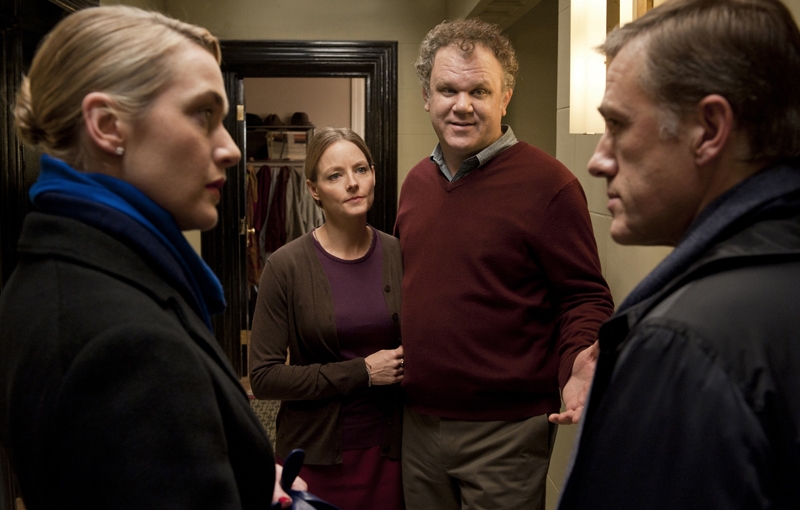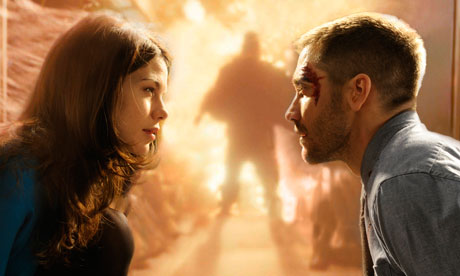 A most impressive cast.
A most impressive cast.
"Why can't they leave?" Luis Bunuel asked Gil Pender in Woody Allen's fantastical "Midnight in Paris" after the latter pitched the former a film idea (that is to say, the plot basics of "The Exterminating Angel"). "They just can't," Gil answered. Such is also the case for Roman Polanski's protagonists in "Carnage", a film based on the Tony award-winning play "God of Carnage", written by Yasmina Reza.
If the bourgeoisie characters in "The Exterminating Angel" can't seem to find a way to leave a lavish dinner party, "Carnage's" characters can't seem to break a cordial meeting (they decided to hold such because of their respective kids' earlier altercation in a park) because of, well, some cobblers, coffee, and just the right amount of angst and mutual disgust.
Watching the film with a certain consciousness of the performers involved, I can't help but feel a larger-than-life thump somewhere within me that reminds me of something akin to a beautiful heart-ache. John C. Reilly, Christoph Waltz, Jodie Foster, Kate Winslet. 4 Oscars and 8 nominations combined. As a film lover, if the mere idea of those names and these numbers joining forces for a film project is not enough to put you into a state of bliss, then I'm afraid nothing will.
Although in essence almost the same with Mike Nichols' "Who's Afraid of Virginia Woolf?" in its approach on situational degradation, only this time armed with parental sensibilities, "Carnage" is tightly humorous and uniquely energetic in all its hard-edged argumentative glory that these actually evoke a certain charm that can only be attributed to this film alone.
The cool but sharp-tongued Alan (Waltz), a lawyer whose intent to actually join in onto the whole conversational fiasco is constantly failing because of the repeated rings of his cellular phone. And then there's his wife, Nancy (Winslet), an elegant woman in her mid-thirties whose collected exterior is not enough to fend off the power of Scotch and nausea.
While on the other side, there's Michael (Reilly), your typical American husband who is, as what his wife claimed him to be, seemingly contented with living a life of mediocrity. And lastly, Penelope (Foster), Michael's wife, a writer who feels the plight of people in Africa (Darfur, specifically) but can't seem to feel the plight of her own lack of emotional control.
These four parents, after they have initially welcomed each other and ate cobblers together like fine, civilized folks, gradually transform into all-out verbal warriors one moment, pathetic criers the next. With wide-reaching topics in the tip of their tongues such as the "John Wayne" concept of manhood, the superficiality of writers, and, well, some hamsters, "Carnage", aside from being a study of contemporary parental thinking, is a teeth-gnashing, word-jousting, vomit-inducing (quite literally) little confessional of a film with just enough unraveling tirades that finely express the film's honest-to-goodness take on the oftentimes childish vulnerability of adult life.
Roman Polanski, after directing the more than impressive "The Ghost Writer", a thriller that is also a borderline adventure film, chose to direct a small, enclosed and set-limited film with only his actors and actresses to create wonders with. Fortunately for the exalted exile, his actors are immediately wonderful all on their own, with a powerful material working greatly to his advantage. What came out is a film that is a bit too standard in its technicalities, but one, just like other stage-to-film adaptations, that is relentless in its verbal athletics, poignant in its emotions and purely articulate in its entirety.
If the bourgeoisie characters in "The Exterminating Angel" can't seem to find a way to leave a lavish dinner party, "Carnage's" characters can't seem to break a cordial meeting (they decided to hold such because of their respective kids' earlier altercation in a park) because of, well, some cobblers, coffee, and just the right amount of angst and mutual disgust.
Watching the film with a certain consciousness of the performers involved, I can't help but feel a larger-than-life thump somewhere within me that reminds me of something akin to a beautiful heart-ache. John C. Reilly, Christoph Waltz, Jodie Foster, Kate Winslet. 4 Oscars and 8 nominations combined. As a film lover, if the mere idea of those names and these numbers joining forces for a film project is not enough to put you into a state of bliss, then I'm afraid nothing will.
Although in essence almost the same with Mike Nichols' "Who's Afraid of Virginia Woolf?" in its approach on situational degradation, only this time armed with parental sensibilities, "Carnage" is tightly humorous and uniquely energetic in all its hard-edged argumentative glory that these actually evoke a certain charm that can only be attributed to this film alone.
The cool but sharp-tongued Alan (Waltz), a lawyer whose intent to actually join in onto the whole conversational fiasco is constantly failing because of the repeated rings of his cellular phone. And then there's his wife, Nancy (Winslet), an elegant woman in her mid-thirties whose collected exterior is not enough to fend off the power of Scotch and nausea.
While on the other side, there's Michael (Reilly), your typical American husband who is, as what his wife claimed him to be, seemingly contented with living a life of mediocrity. And lastly, Penelope (Foster), Michael's wife, a writer who feels the plight of people in Africa (Darfur, specifically) but can't seem to feel the plight of her own lack of emotional control.
These four parents, after they have initially welcomed each other and ate cobblers together like fine, civilized folks, gradually transform into all-out verbal warriors one moment, pathetic criers the next. With wide-reaching topics in the tip of their tongues such as the "John Wayne" concept of manhood, the superficiality of writers, and, well, some hamsters, "Carnage", aside from being a study of contemporary parental thinking, is a teeth-gnashing, word-jousting, vomit-inducing (quite literally) little confessional of a film with just enough unraveling tirades that finely express the film's honest-to-goodness take on the oftentimes childish vulnerability of adult life.
Roman Polanski, after directing the more than impressive "The Ghost Writer", a thriller that is also a borderline adventure film, chose to direct a small, enclosed and set-limited film with only his actors and actresses to create wonders with. Fortunately for the exalted exile, his actors are immediately wonderful all on their own, with a powerful material working greatly to his advantage. What came out is a film that is a bit too standard in its technicalities, but one, just like other stage-to-film adaptations, that is relentless in its verbal athletics, poignant in its emotions and purely articulate in its entirety.










